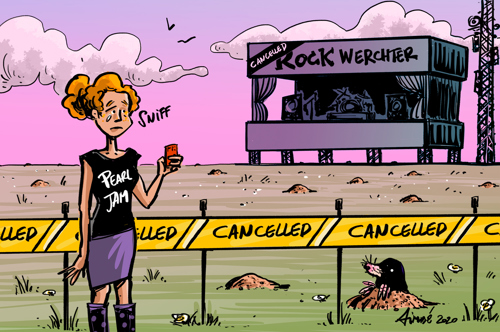- Commercial and Economic Law
- Toon Delie - Ulrike Beuselinck
- corona , corona crisis , events , organising events , cancellation , tickets
To date, the corona crisis has had major consequences in all areas, not the least with regard to the events that have to be cancelled as a result. More and more it is clear that events scheduled for next summer will also be cancelled.
All this leads to a large number of questions regarding the cancellation of events and the extent to which tickets and fees already paid will have to be refunded. Therefore, it is a matter of interest to take a look at the current state of affairs.
Concerning sponsorship contracts for events, we refer to our article 'Sponsoring in times of corona'.
1. First question: "Is cancellation mandatory?
Since mid-March and (currently) at least until 3 May 2020, it is forbidden to organise any 'private or public activity of a cultural, social, festive, folkloric, sporting or recreational nature'.
But, 3 May 2020 is currently the tipping date. Any event organised before this date may not take place. After this date, there is still ambiguity about what kind of events will be allowed, if any.
With the ban periods being extended each time per 14-day tranche, there is still a long way to go for the events that will take place during the summer.
Since it is not yet clear which events may be prohibited, the decision to cancel now lies entirely on the shoulders of the organiser.
2. Does a cancellation will be a force majeure?
In order to determine whether force majeure is involved, the above mentioned tipping date is crucial. If an event is banned due to the corona crisis, it is a force majeure situation for the organiser. This therefore currently applies to all events until 3 May 2020.
For events after this date, such a ban does not apply yet to all events and the organiser of those events is not obliged to cancel or postpone the event. It is therefore debatable whether or not this is a case of force majeure.
On the one hand it is not impossible for the organiser to have his event take place. On the other hand, it remains possible that the government will continue to discourage (but not forbid) events at that moment and there is a risk for the organiser to be held liable for damage caused by this, but it is still possible that events will be banned at a certain point in time.
As long as the government advises against events, it seems appropriate to cancel the events and there is a good chance that this will indeed be regarded as force majeure. However, all this remains a matter of facts and will always remain an extremely difficult decision for the organiser.

3. Do tickets have to be refunded?
When an event is actually banned due to the corona measures, it is a force majeure situation as a result of which the service provider is released from its contractual obligations, namely the organisation of the event.
Conversely, the customer no longer has to comply with his contractual obligations, in this case the payment of the ticket.
The latter can therefore request the reimbursement of his ticket. In that case, the organiser may postpone the event to a later date, but the customer is not obliged to go along with this and can still demand a refund.
In principle, this rule also applies in corona times.
However, with regard to events that have to be cancelled as a result of the corona crisis, the government has issued a special regulation:
- The organiser is entitled to give a voucher of the same value instead of a reimbursement of the ticket, provided the following conditions are met:
- an activity with the same essential characteristics is re-organised at a later date and at the same or a nearby location;
- within two years of the issue of the voucher;
- the voucher has the same value as the original ticket;
- no charge can be made for this voucher;
- no additional cost to attend the later activity;
- the explicit mention of the corona crisis as a reason for issuing the voucher.
- The voucher may also grant the right to purchase other products of the issuer within the period of two years.
- If the visitor can prove that he cannot be present on the new date, he has the right to reclaim the purchase price.
- If the above conditions are not met, the organiser is obliged to refund the tickets by 20 September 2020 at the latest.
Although this scheme mitigates to some extent the consequences of the corona crisis in the short term for organisers and may avoid a refund of tickets if the event is re-organised at a later date, costs and expenses as a consequence of the corona crisis still are for the account of the organiser.
Organizing an event at a later date will undoubtedly involve additional costs for which there is no substitute. And especially if the tickets have to be refunded, the costs already made for the organisation will remain entirely at the expense of the organiser. This corona crisis will therefore be hard to bear for the events sector.
Please, do not hesitate to contact us. It goes without saying, that we can inform or assist you. You can always contact us on +32 (0) 02 747 40 07 or CoronaTaskforce@seeds.law.





